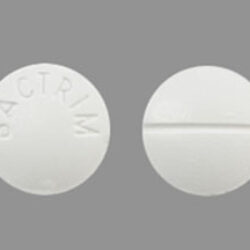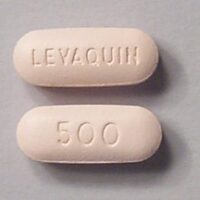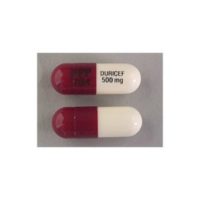Description
Drug Uses
Bactrim is an antibiotic combination containing a sulfonamide antibiotic and is used for treatment of infections caused be certain bacteria.
How Taken
Take Bactrim with or without a meal. It is advised to take it at the same time every day followed by a glass of water. Drink several extra glasses of water, unless otherwise directed by your doctor. Do not stop taking Bactrim without your doctor`s approval, even if you feel better.
Warnings/Precautions
Before taking Bactrim, tell your doctor or pharmacist if you have any medical conditions, especially if you have allergies to medicines, foods, or other substances, if you have liver or kidney problems, blood problems (e.g., anemia, porphyria), asthma, or AIDS, if you have glucose–6–phosphate dehydrogenase deficiency, or an enzyme deficiency, if you are at risk for low levels of folate in the blood (e.g., you have alcoholism, are elderly, you do not absorb nutrients from food properly, you are in a poor nutritional state, you are taking medicine for seizures), if you are planning to become pregnant or are breast–feeding. If you become pregnant, contact your doctor. You will need to discuss the benefits and risks of using Bactrim while you are pregnant. Do not use Bactrim if you are in week 38 of pregnancy or later (full–term). Bactrim is found in breast milk. Do not breast–feed while taking Bactrim. Some medicines may interact with Bactrim. Therefore tell your doctor of all prescription or nonprescription medicine, herbal preparation, or dietary supplement that you are taking. Contact your doctor immediately if you develop stomach pain or cramps, severe diarrhea, or bloody stools. Do not treat diarrhea without first checking with your doctor. Bactrim works only against bacteria, it does not treat viral infections (e.g., the common cold). Long–term or repeated use of Bactrim may cause a second infection. Tell your doctor if signs of a second infection occur. Your medicine may need to be changed to treat this. Bactrim may interfere with some lab tests. Be sure your doctor and lab personnel know you are taking Bactrim. Do not take Bactrim if you had a severe allergic reaction to any other sulfonamide (sulfa) medicine (e.g., glipizide, hydrochlorothiazide), if you are taking dofetilide or if you have anemia caused by low levels of folate in the blood or urinary blockage. Elderly patients may be more sensitive to Bactrim effects. These patients may require a lower dose or/ and special monitoring during treatment. Bactrim should be used with great caution in children younger than 10 years old who have diarrhea or an infection of the stomach or bowel. Do not use Bactrim in children younger than 3 months old. Safety and effectiveness in these children have not been confirmed.
Missed Dose
If you miss a dose take it as soon as you remember. However if it is almost time for the next dose, skip the Missed Dose and continue your regular dosing schedule. Do not take a double dose to make up for a missed one.
Possible Side Effects
Some of the Possible Side Effects are– Appetite loss, diarrhea, nausea, skin sensitivity to sunlight, vomiting. Contact your doctor if any of these or other side effects occur. If you experience any of the following serious side effects, you should seek medical attention immediately– allergic reactions (rash, hives, itching, difficulty breathing, tightness in the chest, swelling of the mouth, face, lips, or tongue), blistered, peeling, red, or swollen skin, bloody or black, tarry stools, chest pain, chills, fever, or sore throat, decreased urination, depression, hallucinations, irregular heartbeat, joint or muscle pain, painful or stiff neck, purple patches under the skin, seizures, severe diarrhea, severe or persistent cough, severe or persistent headache, severe or persistent nausea or vomiting, shortness of breath, stomach cramps/pain, unusual bruising or bleeding, unusual tiredness or weakness, unusually pale skin, vaginal irritation or discharge, yellowing of the skin or eyes.
Storage
Store Bactrim at room temperature, between 59 – 77 °F (15 –25 °C). Store away from heat, moisture, and light. Keep in a tight, light–resistant container. Do not store in the bathroom. Keep Bactrim out of the reach of children.
Overdose
If overdose is suspected seek medical attention immediately. Some of the symptoms of Bactrim overdose are– blood in urine, confusion, depression, dizziness, drowsiness, loss of consciousness, severe nausea or vomiting, severe or prolonged headache, unusual bruising or bleeding.
More Information
Bactrim may cause you to become more sensitive to the sunlight. Avoid the sun, sunlamps, or tanning booths until you know how you react to Bactrim. Use a sunscreen or wear protective clothing if you must be outside for more than a short time.Do not share this medicine with others for whom it was not prescribed. Do not use this medicine for other health conditions. If your symptoms do not improve or if they worsen, contact your doctor.
Disclaimer
This is only general information, it does not cover all directions, drug integrations or precautions. You should not rely on it for any purpose, it does not contain any specific instructions for a particular patient. We disclaim all responsibility for the accuracy and reliability of this information. We`re not responsible for any damage.




Reviews
There are no reviews yet.